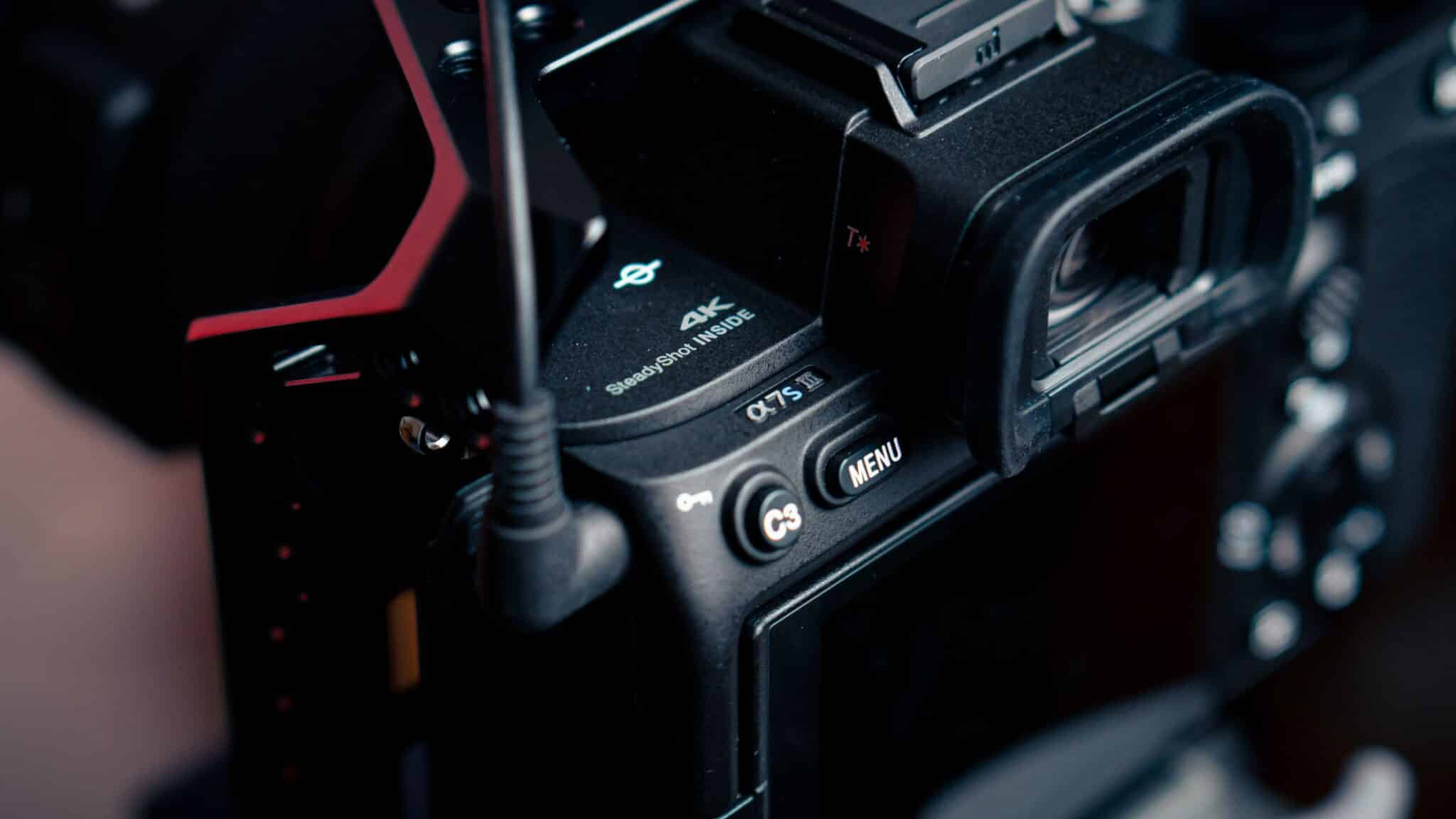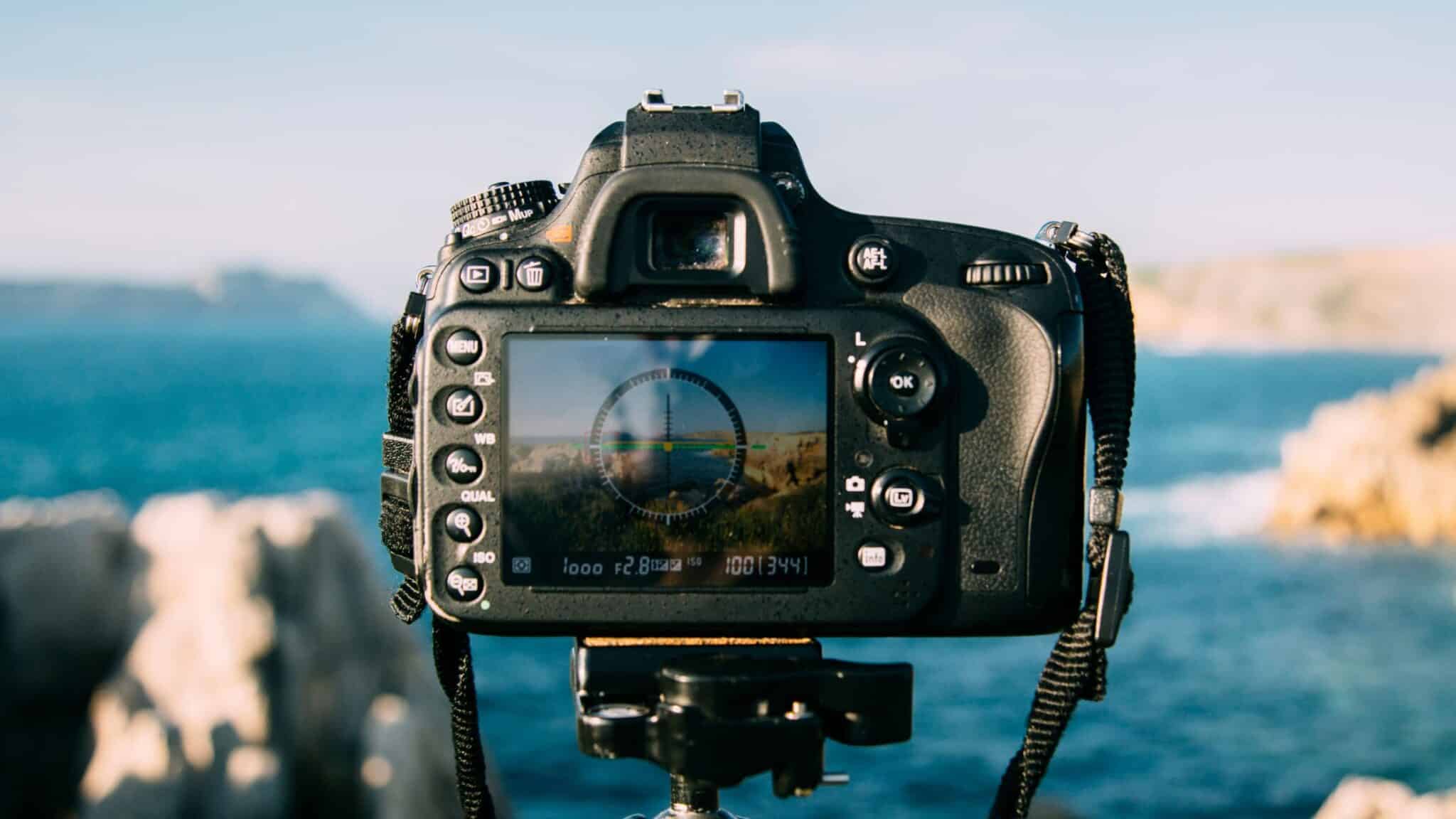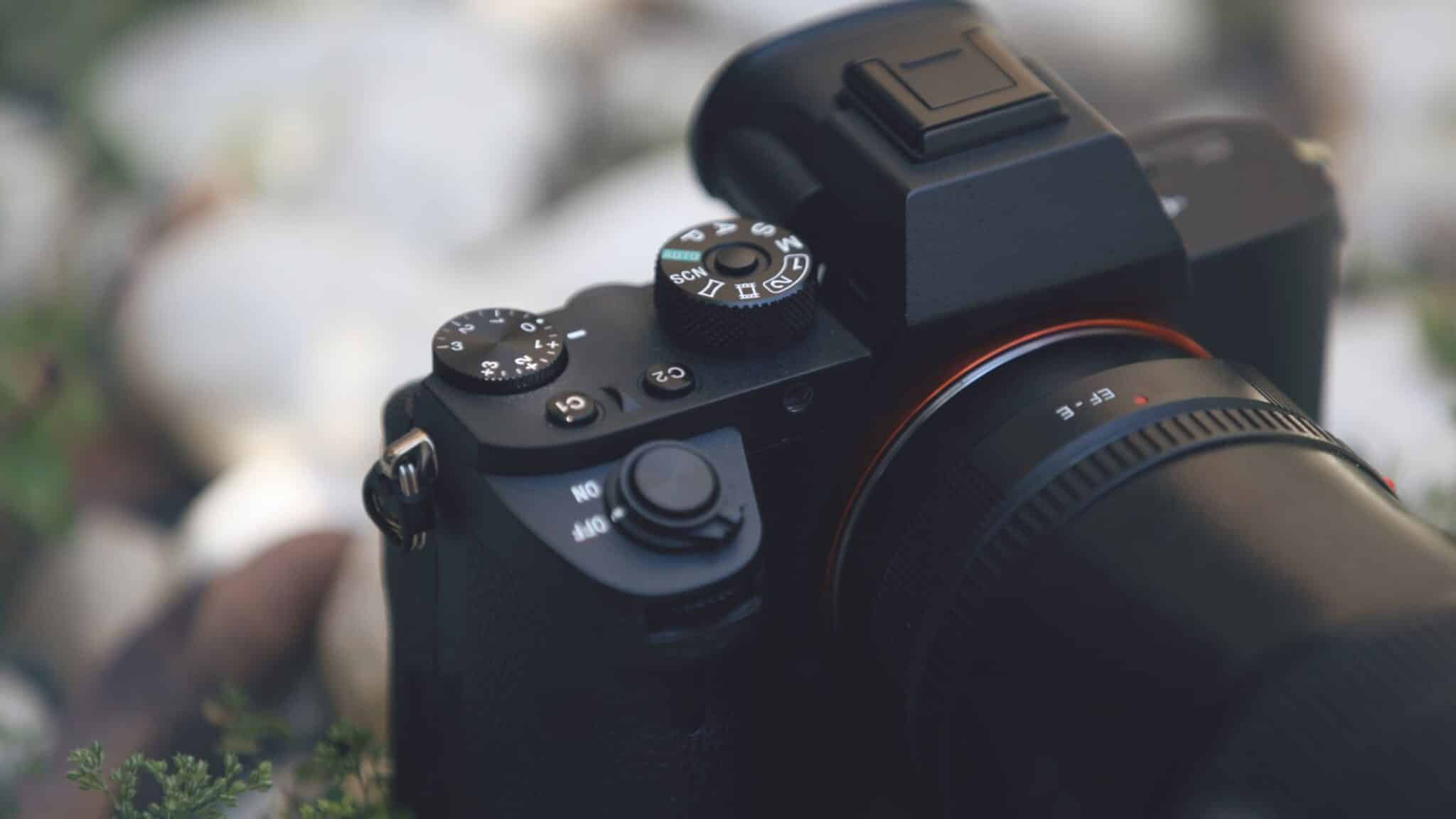Mirrored vs. Mirrorless Cameras
Written by Colette Nichol, Solo Filmmaker and Story Strategist
Estimated reading time: 8 minutes
In the world of filmmaking and photography, understanding your equipment is crucial. A common question amongst beginners is, “What’s the difference between mirrored and mirrorless cameras!?” This post will delve into how each works and their distinct characteristics to help you make an informed decision about what type of camera to buy.
As a solo filmmaker and video creative, I’ve used DSLRs (mirrored), mirrorless cameras, cinema cameras, and even old-school camcorders for my work. Right now I use a cinema camera (the Blackmagic 6k) and a mirrorless (Canon R6) for most of my work. But, I still LOVE my Canon DSLR (70D). And I’m not against beginners starting out with a DSLR, especially if they like the old-school feeling of dials, knobs, and looking through a viewfinder.

The Best Depends on Your Needs
If you’re in the middle of the buying process, I recommend reading my article on The Best Camera for Beginners.
It covers basically everything you could possible want to know about the top entry-level and intermediate cameras for filmmaking, video and photography.
OK, now let’s get into the the mirrorless vs. mirrored debate!
How DSLR Cameras Work
DSLR, or Digital Single-Lens Reflex cameras, are known for their intricate mirror mechanism.
When you look through a DSLR’s viewfinder, you’re seeing a real-time reflection via a mirror that redirects the light from the lens. Upon pressing the shutter, this mirror flips up, clearing the path for light to hit the sensor and capture the image.
This traditional approach offers the tactile feel of old-school SLR photography.
Many creators value this way of shooting. Personally, I love looking through an optical viewfinder. It’s easier on the eyes, and it gives an accurate representation of what I’m capturing. It also helps me enter the feeling of photography which is different from shooting video.
However, for video, if you want to be able to look through a viewfinder while shooting moving images, you’ll need to use a mirrorless camera that has an electric (i.e. digital) viewfinder. I haven’t seen a camera where you can look through an optical viewfinder while shooting live video.
The Functioning of Mirrorless Cameras
Mirrorless cameras simplify the process of viewing your shot.
They eliminate the mirror system, allowing light to directly strike the image sensor, which then displays the image on an electronic viewfinder or the rear screen.
This not only makes mirrorless cameras more compact and lighter but also enables faster shooting rates and a real-time digital preview of the image, aiding in more accurate exposure and focus settings.
And it means you can use the EVF (electric viewfinder) while shooting video, which can be very helpful if you want to shoot handheld as that third stabilization point (your forehead) can make the image less wobbly.
Key Differences Between Mirrored and Mirrorless
1. Mirror Mechanism: The most fundamental difference is the mirror. DSLRs use it for their optical viewfinder, while mirrorless cameras directly project the image onto the sensor for a digital preview.
2. Image Quality: Both DSLRs and mirrorless cameras can produce high-quality images. Mirrorless cameras have made significant strides, often matching or surpassing DSLRs in image quality.
3. Autofocus Speed: Mirrorless cameras typically offer faster and more accurate autofocus, especially in video mode, thanks to advancements in their sensors and autofocus technologies. They typically have better continuous autofocus which allows you to track a subject in video mode or while doing photography.
4. Lens Availability: DSLRs have a broader range of lenses, thanks to their long-standing presence in the market. However, mirrorless systems are rapidly catching up, with many manufacturers expanding their lens offerings. You can also buy adaptors which allow you to use your DSLR lenses on a mirrorless camera.
5. Video Performance: Mirrorless cameras generally outperform DSLRs in video. They are lighter, more compact, and often include features better suited for video recording. The biggest things that can make mirrorless cameras easier to use when doing video is the focus peaking and zebras which most mirrorless cameras offer you even at an entry-level cost. These two things make exposure and grabbing focus more foolproof.
6. Viewfinder: DSLRs offer an optical viewfinder, providing a direct optical view through the lens. In other words, you see the real world. Mirrorless cameras use electronic viewfinders which can display more shooting information and offer a digital preview of the final image.
I really prefer the optical viewfinder for photography. Alternatively, I do like to shoot photography while looking at the LCD screen. I don’t like doing photography off while looking through the EVF.
7. Beginner Friendliness: Mirrorless cameras can be more user-friendly for beginners due to their lighter weight and the helpfulness of an electronic viewfinder for learning exposure and composition. But for photography, many people prefer DSLRs, even today.
8. Price Range: The price varies in both categories. While mirrorless cameras can be more expensive, there are budget-friendly options, just as there are in the DSLR category.
Related Post: Best Camera for Beginners: Video, Photography, and Content Creation

Common Questions
What is the fundamental difference between mirrored and mirrorless cameras?
The fundamental difference between mirrored (DSLR) and mirrorless cameras is the presence or absence of a mirror mechanism.
DSLRs use a mirror to direct light from the camera’s lens to the optical viewfinder. When you take a photo, the mirror flips up, exposing the image sensor. Mirrorless cameras, on the other hand, lack this mirror. They rely on electronic displays, such as LCD screens or electronic viewfinders (EVFs), to preview the image. This design makes mirrorless cameras generally more compact and lightweight.
Does the image quality differ between DSLRs and mirrorless cameras?
Image quality depends on various factors, including the camera’s sensor size, resolution, and the quality of lenses used.
In general, there is no significant difference in image quality between DSLRs and mirrorless cameras with similar specifications. Both can produce high-quality images.
How does the autofocus speed of mirrorless cameras compare to DSLRs?
Mirrorless cameras have made significant advancements in autofocus technology and can offer very fast and accurate autofocus, often using phase-detection or contrast-detection systems. Some mirrorless cameras even surpass DSLRs in autofocus speed, but it can vary by model and brand. Modern DSLRs also have excellent autofocus systems, so the difference may not be substantial in practice.
Is there a difference in lens availability for DSLRs and mirrorless cameras?
DSLRs have been around for a longer time, so they generally have a wider selection of native lenses available.
However, mirrorless camera systems have been rapidly expanding their lens libraries, and most major camera manufacturers offer a range of lenses for their mirrorless systems. Additionally, adapters are available to use DSLR lenses on mirrorless cameras.
Are mirrorless cameras better for video than DSLRs?
Mirrorless cameras are often favoured for video because they are typically more compact and lighter, making them easier to handle for video recording.
They also almost always often offer features like 4K video recording, focus peaking, and silent shooting. However, DSLRs can still capture high-quality video in 4k or more, and the choice between the two depends on specific needs and preferences of the user. I usually recommend you go into a store (if possible) and feel the camera in your hands.
What are the viewfinder differences between DSLRs and mirrorless cameras?
DSLRs typically have optical viewfinders that provide a direct, through-the-lens (TTL) view of the scene.
Mirrorless cameras use electronic viewfinders (EVFs) or LCD screens for composing shots. EVFs can offer real-time previews with exposure and focus adjustments, but some photographers prefer the optical viewfinders of DSLRs for their natural and lag-free view.
Which type of camera is better for beginners?
Both DSLRs and mirrorless cameras can be suitable for beginners, and the choice often depends on personal preferences and budget.
Mirrorless cameras are generally more compact and offer modern features like live view and helpful shooting aids. DSLRs can feel more intuitive in terms of the dials and knobs on the camera. Their menu system is usually less complex. And looking through an optical viewfinder is awfully nice when doing photography. So what you choose depends on what you want to shoot, the specs you want, and how you want your camera to feel in your hands.
Is there a significant price difference between DSLRs and mirrorless cameras?
The price difference between DSLRs and mirrorless cameras can vary widely depending on the specific models and brands.
In recent years, the prices of both types of cameras have become more comparable. Entry-level models for both DSLRs and mirrorless cameras are usually affordable, but high-end models can be more expensive, regardless of the camera type.

Final Thoughts
When choosing between a mirrored (DSLR) and a mirrorless camera, consider your specific needs.
If you prefer the traditional feel of photography with an extensive lens selection, a DSLR might be for you. If size, weight, and advanced video capabilities are your priority, a mirrorless camera would be more suitable.
Both camera types offer a range of options for beginners to professionals. Ultimately, the best camera is the one that fits your personal shooting style and meets your production needs.
More Filmmaking Articles
⭐ What is a Mirrorless Camera?
⭐ Learn How To Use a Filmmaking Camera
⭐ The Best Lens For Video Hands Down

About the Author
Hi! I’m Colette Nichol. I’m a solo filmmaker and story strategist based out of rainy Vancouver, Canada. I’ve been making videos and micro films for small businesses and global brands since 2014.
Plus, I LOVE to help aspiring filmmakers pursue their dreams and start making films. This blog is designed to help you gain the knowledge you need to become a filmmaker.
If you want more, get on the waitlist for the Story Envelope Academy Solo Filmmaking Mentorship Program. It opens up one time per year and is the best way to become a filmmaking or video pro fast!
CLICK HERE to get on the solo filmmaking mentorship waitlist.